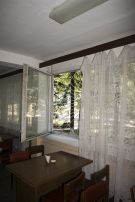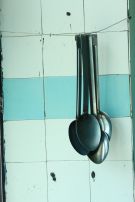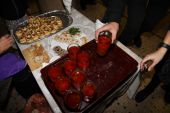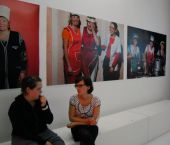|
||||||||||||||||||||||||
| Panerių g. 41 SVETINGUMAS |
||||||||||||||||||||||||
|
||||||||||||||||||||||||
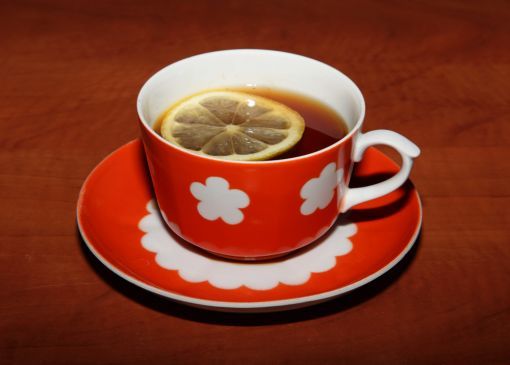
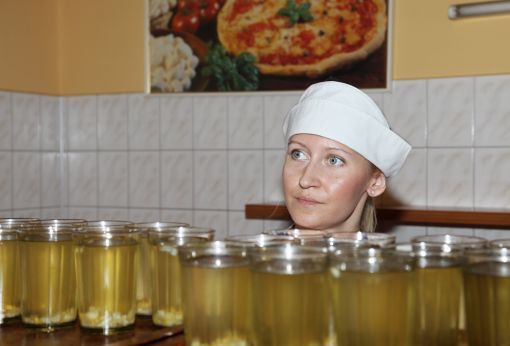
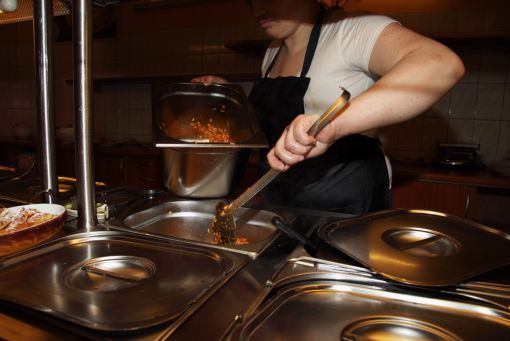
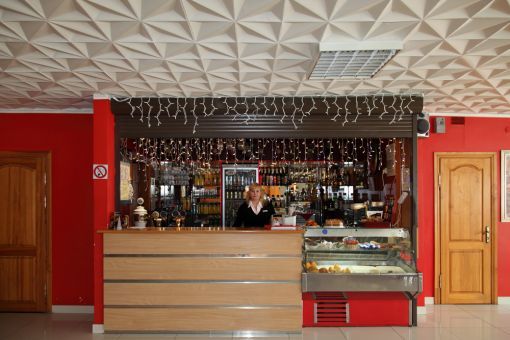
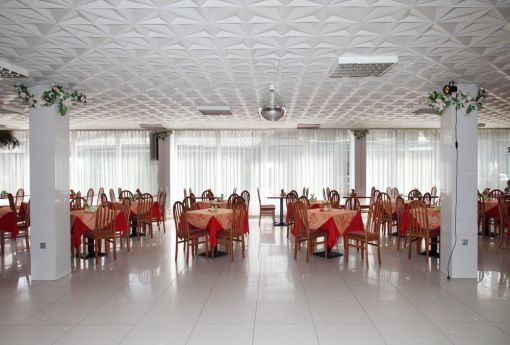
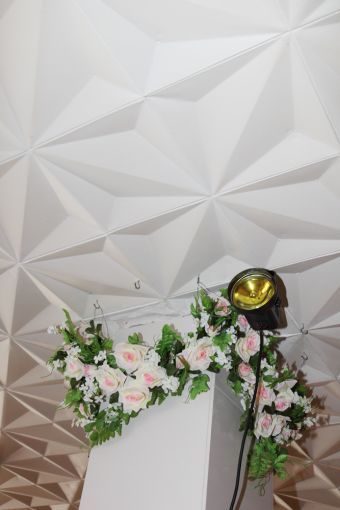

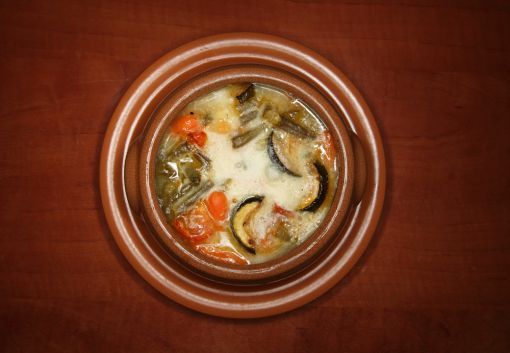


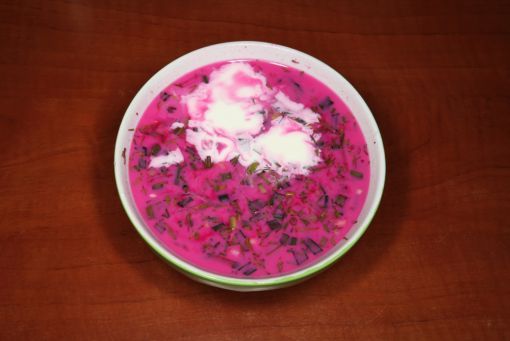
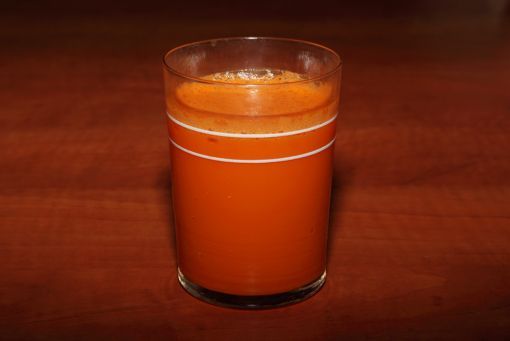
|
||||||||||||||||||||||||
|
Vadovė Jelena
When we meet, Jelena says:
Your project seems to be interesting. I think it's the first time something like this has come along.
Thank you. We are trying to stop these frequent closures of canteens.
Well, this project is not enough to stop the closures. We need a lot of support ... (laughing). Everything is connected here... It's great that Indrė is interested in this canteen, but I think there is nothing worth attention here - no style, no design. Just the style of a normal canteen. Only this one is renovated.
How long have you worked here?
For ten years. But not as a director; I started as a bar attendant.
What are your responsibilities now that you work as a director?
Well, according to the law, I am responsible for everything. Still, there are shareholders that give orders and I execute them.
Maybe you know what this place used to be before it was a canteen?
It used to be a Soviet canteen called "Soviet Hope" or "Hope"... It used to be an industrial district here and there was a huge factory "Elfas", too. So all the workers used to come to this canteen for lunch. On lunch break there were long queues and all the tables were occupied. Those were the good times, and turnover was good. That was before privatisation.
Why did you start to work here exactly?
There were a number of factors... You could say it is our family business; my whole family works here. We try to work; to survive.
So, you were working in canteens before you came to work here?
No, this was my first canteen. My other speciality is as a seamstress.
How many people work here?
25, on average.
So, it's a huge canteen. How many visitors do you serve per day?
I cannot say we have lots of visitors. Maybe we have more staff than we need, but I care about people and don't want to fire anyone; to leave them without a job. Most of our staff are single women with, for example, three kids. So we try to survive.
And how many bar attendants, cooks, etc do you have?
There used to be two women on the bar. However, we had to fire one.
How does an ordinary day in this canteen start? Do cooks come first?
Well, everyone has their own schedule when to come to work.
And how do you make a menu for the next day?
Every day we think of a different menu. For example, today up until 2 p.m. menu will be printed for the next day.
So you experiment with the menu every day?
No, we don't experiment. We do everything according to calculations. But we have more than 1000 recipes - traditional, non-traditional, and from different cuisines. The production manager sets the menu. She controls supplies, and sets the menu according to them. Of course, we discuss it, make some improvements, or vice versa.
How would you describe the cuisine in this canteen?
I would say it's traditional cuisine.
What dish do people eat most often?
Cepelinai (traditional Lithuanian dish, a type of dumpling made from grated potatoes and usually stuffed with minced meat). Yes, cepelinai. All dishes made from potatoes; fried potatoes are most popular here.
Why do you think it is so?
I think the combination of ingredients in cepelinai is quite filling and the price is reasonable. And perhaps because of Lithuanian consciousness.
Could you tell us about your clients? As it is such a big canteen. Was it always that big?
Yes, it was. Clients... nowadays not all the tables are occupied at lunchtime. There are some flows of people coming. For example, at some hours we have more than half a room of diners. At this moment, you could look around and think there are no visitors or turnover at all. But the reason is that the peak time is over. Most of our clients are workers; there used to be railroaders, too,but now I heard about reductions of staff, so less railroaders come for lunch. Then we have people from offices. From the services of cars. People who work around here mostly. Though, there used to be people who were coming from further to have lunch here,ut as I say: everything is changing. Now some more cafes have opened.
Is there any competition in this business?
1, 2, 3, 4... There are 3 cafes in this building alone, so competition is quite strong. Though, there is the human factor. No cook can guarantee that the same dish will taste the same every day. People make mistakes, naturally.
There is also a second floor of this building. What used to be there? Something important?
Back in Soviet times there used to be a restaurant. I don't know. I was not working here. I just heard. Now there is a banquet hall there.
You are organising banquets and parties for those who are over 30 years old. Whose idea was it?
Well, the idea was mine. We have to use this huge space somehow. So I thought of this idea. People gather for the party, but the clients have also changed. You see, if we just wanted money, we would let anyone come, but we try to control that. So we refuse to let in noisy visitors. It doesn't matter if they have money or not. Some gypsies used to come here, too. So we decided that it is more important to have a tidy and cultural atmosphere here. Here we have live bands performing; people can dance. So the idea has answered the purpose.
And what about the interior? Maybe you know how many times it was changed? We see that the canteen was renovated not long ago...
You know, the floor and ceilings are the same as it was in Soviet times. It is the base of the canteen. And those disco lamps... There was no other choice at that time. There used to be some youngsters that tried to steal something. Also drug addicts used to come in. They could rip the lamp off the wall in 5 seconds, even during the daytime. This is our reality - we work in this kind of district.
What would you do if you were not working in the canteen?
I think I would start my own business. I have this impulse to make something on my own. I don't know if it would be related to catering. After the years of working here, I think I could. Actually, this kind of business is less risky as the money comes right away.
What is most important in this kind of business?
If talking about food, the quality is the most important issue. We don't use any chemicals. We don't use any mix of spices, we make everything from natural products.
How did you keep it all going in those days, and in this difficult situation?
Well, we work. A lot. We don't have personal lives - we work on weekends and on holidays. And we save; we try to keep people working.
You say that you use only natural products. Who are your suppliers?
We try to check suppliers before contacting. We look for those that have good recommendations. For example, we hear the different references about the butchery business. For example, one company has won a competition recently, so we chose it, though the price was higher. They supply meat from Lithuania, not from Poland. And it is not treated with any chemicals. It is just frozen. We order it every second day. We also eat in this canteen. We wait for lunch in the same queues as clients. You can tutor the staff only by tutoring yourself. You have to show a good example. And we don't have a lot of food left at the end of the day. As our chef is working until 5 p.m., so she can see what the situation is, what to cook or not to cook, so that everything will be sold. We make 5-10 portions of each dish.
And do you cook at home?
I try to cook, myself, but sometimes when I don't have time, I take food from the canteen. I buy it here and drive home.
Do you cook using the recipes from TV shows, for example Oliver show?
Well, no. I dream of retirement... I have a wish, but no time...
What is your favourite dish?
Favourite dish... I like vegetables. I am not a vegetarian, so I like dishes with lots of vegetables. I guess, there is no one concrete dish. I like natural food, so it would be treated in any way less. For example, natural meat without pulled bread added.
Do you use any slang in your kitchen? How do staff communicate with each other?
We are one chain of people. Every element in it is very important. We have a common aim, and reaching for it, we realise our own needs, like salary, etc. If we thought only about ourselves, we wouldn't be able to reach our aims, and we wouldn't even have a job in that case. Also the director should be an example to the staff. You have to show a good example, instead of requiring something from the staff. Well, now I am studying, so I work here less, but we have to keep that connection to the staff.
